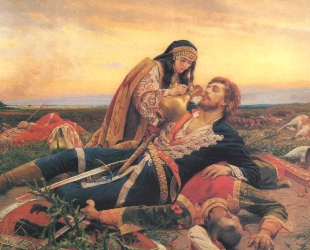May 31, 2010
Learning by Heart
I grew up in a family of storytellers, but the best storyteller by far was my grandfather, Nikola. A shy and tender man, always a perfect gentleman, he entertained his grandchildren with stories and wondrous recitals of Serbian epic poetry. Every story and poem he told us was from memory. I never saw him read a book but I know that my love of books and literature descend directly from the creative mind of this gentle man.
My earliest memories are of us (a number of very young grandchildren) begging our grandfather to tell us a fable or recite a poem about the heroic battles of the glorious Serbs fighting the Ottoman Turks. My grandfather loved children and even when he was extremely busy with the work of running a farm and taking care of his land, I never remember him refusing our requests.
Grandfather made a magical game out of every experience. On the spacious veranda of his old house, he would set little stools in a circle for us to sit on, settle in the middle of our group and start a poem. Transported in a second, we left the village on the wings of my grandfather’s rhymes and floated to the heroic adventures of Serbian medieval warriors.
Knights, ladies, silk gowns, gold, honor, swords, betrayal, vengeance, family, friendship, pride, love, death, Serbian valor, Turkish valor, history, Kosovo – those are the topics that fired our young imaginations. Told from memory, in predictable and well ordered rhyme, we knew all those poems by heart ourselves without even noticing that we have learned them.
They are still with me. They never left.
The Banquet on the Eve of the Battle
(a fragment)
Prince Lazar his patron saint doth honour
On the fair and pleasant field Kossovo,
With his lords is seated round the table
With his lords and with his youthful nobles
On his left the Jug Bogdan is seated,
And with him nine Jugovitch, nine brothers;
On his right Vuk Brankovitch is seated,
And the other lords in their due order;
Facing him is Milosh, that great warrior,
And with him two other Serbian leaders
Kossanchitch, and young Toplitza Milan.
Tsar Lazar lifts high the golden goblet,
Thus he speaks unto his Serbian nobles:
“Unto whom shall this my cup be emptied?
If it be old age that I should honour
Then, oh Jug Bogdan, I must now pledge you;
If it be high rank that I should honour
Then Vuk Brankovitch, I must now pledge you;
If the voice of feeling I should follow
To the Tsaritsa’s nine well-lov’d brothers
To the Jugovitch, my toast is owing;
If it beauty be that I should honour
Ivan Kossanchitch, I must now pledge you;
If heroic looks I now should honour
Then Toplitza Milan, I must pledge you;
If heroic deeds are to be toasted
I must drink to that great warrior Milosh,
I can surely pledge no other hero.
Milosh Obilitch, I drink to thee now,
To thy health, oh Milosh, friend and traitor!
Friend at first, but at the last a traitor.
When the battle rages fierce to-morrow
Thou wilt then betray me on Kossovo,
And wilt join the Turkish Sultan, Murad!
Drink with me, and pledge me deep, oh Milosh,
Drain the cup; I give it thee in token!”
To his feet leaps Milosh, that great warrior,
To the black earth bows himself, and answers:
“Tsar Lazar, for this thy toast I thank thee,
Thank thee for the toast and for the goblet,
But for those thy words I do not thank thee.
For—else may the truth be my undoing—
Never, Tsar Lazar, was I unfaithful,
Never have I been, and never will be.
And to-morrow I go to Kossovo
For the Christian faith to fight and perish.
At thy very knees there sits the traitor,
Covered by thy robes he drains the wine-cup,
’Tis Vuk Brankovitch, th’ accurséd traitor!
And when dawns the pleasant day to-morrow
We shall see upon the field, Kossovo,
Who to thee is faithful, and who faithless.
And I call Almighty God to witness
I will go to-morrow to Kossovo,
I will slay the Turkish Sultan, Murad,
And I’ll plant my foot upon his false throat;
And if God and fortune so befriend me,
I will take Vuk Brankovitch then captive,
Bind him to my battle-lance! Yea, tie him
As a woman ties hemp to her distaff,
And I’ll drag him with me to Kossovo.”
This is a fragment of a famous epic poem about the “Last Supper” set on eve of the battle of Kosovo. The translation does not do it justice, but it is the best I could find.
Source: Serbian Epic Poetry


